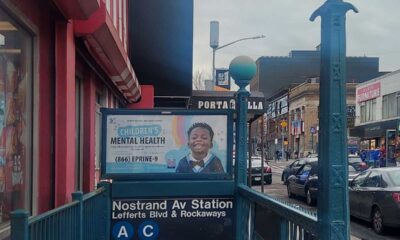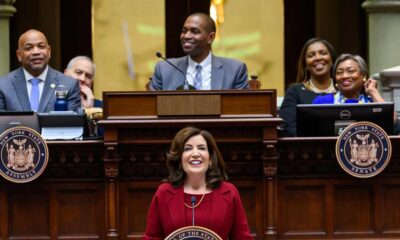Community News
New York State Beauty Schools Will Now Require a Course on Black Hair Care

by Fern Gillespie
During his travels around New York State, Queens State Senator Jamaal T. Bailey kept getting frustrated trying to find local barbers that could cut African American hair. This inspired him to introduce Bill S6528A, a law that would require all New York State cosmetology schools to make the education of all hair types, textures, and natural hair a part of the curriculum.
Already, New York State had passed the Crown Act making hair discrimination illegal. However, Bill S6528A would take Black hair care into the classroom. It would be part of the curriculum instead of an additional instruction cost.

Michaelle C. Solages
On November 17, Governor Kathy Hochul signed Bill S6528A into law. The law will take effect in six months. It will prepare cosmetology students, regardless of race, with the knowledge to work across every hair texture. The law states that students will have the ability to provide styling and hair-care services to individuals with all hair types and textures, including, but not limited to, various curl or wave patterns, hair strand thicknesses, and volumes of hair.
Long Island Assembly Member Michaelle C. Solages, a fifth-term legislator, carried Bill S6528A as the main Assembly sponsor. She is also Chair of the New York State Black, Puerto Rican, Hispanic & Asian Legislative Caucus. “I’m proud to have made the cosmetology field more representative and empowering for individuals with diverse hair textures. As someone with textured hair, I understand the significance of ensuring that individuals with diverse hair textures receive the attention and expertise they deserve in the cosmetology field,” Solages told Our Time Press. “This legislation represents a transformative step forward in making the industry more representative and welcoming for everyone.”
“When I first ventured into politics and won my first election, I encountered a moment where a close political consultant advised me to straighten my hair, citing the misguided belief that textured hair was unprofessional. It was a disheartening suggestion, reflecting outdated standards that unfairly stigmatize natural and diverse hairstyles,” she said. “There has been a historical bias favoring straight, chemically relaxed, or traditional, sleek hairstyles as more “professional” or “serious.” I deliberately defied this stereotype and openly embraced my naturally coiled hair. Now, a decade later, I am the mother of two daughters with curly hair. My dedication to authenticity and dismantling such stereotypes isn’t just a personal decision; it’s also a stance for promoting diversity and inclusivity across all professional domains.”
Since the 1970s, Alfred Fornay has been renowned as a leading expert in the African American beauty industry. He is the author of four major beauty books for Black women, founding editor-in-chief of EM: Ebony Man Magazine, head of beauty programs for Fashion Fair Cosmetics, and the first African American creative director for Revlon. “It starts with the education in the beauty schools. They set the tone in terms of the tools of the trade,” he told Our Time Press. “It would be welcome, in terms of the illustrations, to see a black face with kinky hair in a textbook. There’s a way to touch hair and tell a person what type of hair they have. I think all of this is welcome. It does not exist, in my understanding, in New York State in terms of textbooks. I have textbooks here on my shelf. I would like to see one textbook that includes all textures of hair.”
Nilijah Williams, who grew up in a family of hairstylists, has been styling hair professionally for over 10 years. As founder and owner of The Beauty Boutique in Bed Stuy, she specializes in creative and healthy haircare services for all hair textures and lengths. “I think people should be free to choose whatever texture they want to deal with. I do all the textures of hair,” Williams told Our Time Press. “But, I think as a curriculum in beauty school, it’s great for people to learn. To have the knowledge and education. It’s only going to make you a better hairstylist.”













